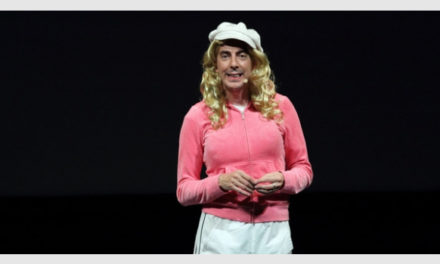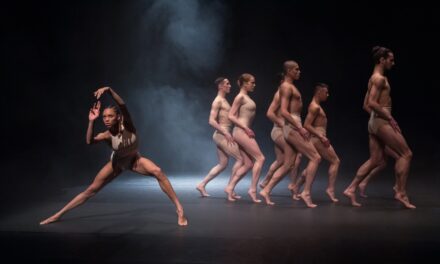Fiordiligi (Kirsten McKinnon), Despina (Ana Quintans) and Dorabella (Rachel Kelly) in Glyndebourne’s Così fan tutte – photo supplied by the Theatre Royal
–<<o0o>>–
‘They all do that!’
The underlying premise to Mozart’s perennial favourite opera Così fan tutte is an astonishingly misogynistic premise, that women are creatures of perpetual infidelity whose pretty heads will be turned by any passing charmer regardless of commitments that they have so lately entered into wholeheartedly.
This premise allows the artful Mozart to set up a little self-contained drama of love, lust and bravado with a cast of just six characters. Young lovestruck gentlemen Guglielmo (Ilya Kutyukhin) and Ferrando (Bogdan Volkov) meet their older, wiser and possibly more cynical friend Don Alphonso (José Fardilha) at their favourite cafe. They are full of the joys of their first love and extolling the perfect fidelity of their betrothed. Don Alphonso enrages them by suggesting a wager that they are not so faithful, indeed like all women their heads will be easily turned. The young men see this as a chance to win an easy bet, and agree to go along with Alphonso’s caper for the day.
This caper requires the young men to be called away to do their military service, with tearful farewells from their partners professing undying loyalty, while in their place immediately appear two new swooning suitors, played in a suitable disguise by Guglielmo and Ferrando themselves, masquerading as moustachioed Albanians captivated by the beauty of Guglielmo’s fiancee Fiordiligi (Kirsten McKinnon) and Ferrando’s betrothed Dorabella (Rachel Kelly). The only other key player is the young ladies’ conniving maidservant Despina (Ana Quintans), who is happy to take a few coins from Don Alphonso to help his plot unfold.
While the six principals undertake all the singing the stage is occasionally filled with a choral horde of obliging locals who appear to exist only to serve the whims of these leisured ladies and gents.
The set and costumes are classically simple and elegant and no doubt appropriate to the time of the opera’s creation 230 years ago.
So will the fickle young girls forget their vows to the departing soldiers and resist the blandishments and entreaties of the handsome Albanian interlopers? Well, remember Mozart wrote this (along with librettist Lorenzo da Ponte) so the answer is a bit more complicated than we might have expected. You may have to catch the matinee on Thursday at 14.00 to find out!
The Glyndebourne audience is not one to settle for second best in anything, and they will not have been disappointed by this production. The six leads are all fine singers, with acting skills that bring out the best in the libretto while each adding their own character finesse and charm. Fardilha’s Alphonso is witty and mischievous while remaining urbane and dignified throughout. The two sisters Fiordiligi and Dorabella are, like many sisters, very different in their ways. Fiordiligi is more inclined to be loyal, and appears to be driven by a deeper passion than her impressionable sister Dorabella, who seems ready to weaken to the new suitor’s charm more quickly. But Kelly’s Dorabella is also puckishly full of naughty fun and has a very expressive face, perfect for this role. Meanwhile McKinnon handles the complex arias that Mozart wrote for Fiordiligi with ease and skill. Mozart did not like the singer he wrote the role for, Adriana Ferrarese, so created a challenging score for her to perform.
The character who has the most fun is the maid Despina, who also manages to double as a doctor and a notary to help Alphonso’s plot along. She is full of good advice for the impressionable young girls, who fall for all of it without realising that they are being played by older and wiser heads than their own. Ana Quintans give us a joyous and vivacious Despina, and appears to thoroughly enjoy every moment on stage.
The two young male leads are both suitably macho and earnest in their every move, but both Kutyukhin and Volkov sing beautifully and display the wide range of emotional reactions that the roles require. They each manage the transition from manly swordwielder to swooning lover with apparent ease as their characters realise that they have been duped just as much as their hapless girlfriends by the wily Alphonso.
This cast give us a faultlessly sung opera that is full of added character, humour, pathos and acute observation of human flaws and weaknesses. The music is wonderful of course and conductor Leo McFall deserves the warm applause he received at the curtain calls. This Glyndebourne production gives us Così fan tutte as an unmodernised and splendid classic – an opera with much more sex and rather less violence than most great works in the operatic canon.
This is no end of the pier make-do show, it is a skilfully crafted show by one Britain’s best companies, but like the end of the pier comedian Glyndebourne are here all week, with The Barber of Seville tonight and on Saturday and the much awaited new Hamlet on Friday evening.
© Julian Swainson 2017
Listing:
Così fan tutte, Tuesday 14 November at 7.15pm and Thursday 16 November at 2pm. Il barbiere di Siviglia, Wednesday 15 November at 7.15pm and Saturday 18 November at 7.15pm. Hamlet, Friday 17 November at 7.15pm. Tickets £8-£55. Discounts for Under-18s, Schools, Groups and Savers. Please note Supertitles are not visible from Stalls seats in Rows Q-W. Buy a full-price ticket for Hamlet in Bands A-C and get £10 off the same price ticket for Cosi or Barbiere.
To book, log onto www.theatreroyalnorwich.co.uk or call the box office on 01603 630000
To book, log onto www.theatreroyalnorwich.co.uk or call the box office on 01603 630000




Recent Comments